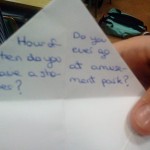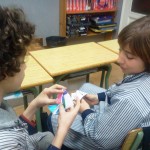A sample text widget
Etiam pulvinar consectetur dolor sed malesuada. Ut convallis
euismod dolor nec pretium. Nunc ut tristique massa.
Nam sodales mi vitae dolor ullamcorper et vulputate enim accumsan.
Morbi orci magna, tincidunt vitae molestie nec, molestie at mi. Nulla nulla lorem,
suscipit in posuere in, interdum non magna.
|
By júlia verdaguer, on maig 20th, 2013% Hamish, Conversation Assistant at Escolàpies Llúria, has shared with us this fun game idea, that he put into practice with his 1-ESO students. Thanks a lot 🙂
………………………………………………………..
 In February, in our weekly 1º ESO speaking classes, we did something a little different. The kids were given paper, and told to fold it into a fun flap (if you aren’t familiar with the name, you’re not alone; I’d never heard the name before, even though I was familiar with the game, and it took my colleague Rosa Maria several years of research to find the correct name). In February, in our weekly 1º ESO speaking classes, we did something a little different. The kids were given paper, and told to fold it into a fun flap (if you aren’t familiar with the name, you’re not alone; I’d never heard the name before, even though I was familiar with the game, and it took my colleague Rosa Maria several years of research to find the correct name).
Once they had their fun flaps folded and ready, they began the English work. The aim was to practise asking and answering questions in the present simple. On each flap, the students wrote a question using sentence starters like ‘How often do you…?’ and ‘Do you ever…?
 Whilst they were making their fun flaps, I was walking round the class, helping with grammar and springing questions on them with a fun flap I’d made earlier. Questions written, the activity began; in pairs, the students played with the fun flaps, asking and answering questions at random, until, at our signal, they changed partners and started again. Whilst they were making their fun flaps, I was walking round the class, helping with grammar and springing questions on them with a fun flap I’d made earlier. Questions written, the activity began; in pairs, the students played with the fun flaps, asking and answering questions at random, until, at our signal, they changed partners and started again.
The students really enjoyed the activity; it was something different from what they were used to, and it also gave them the chance to write their own questions. Thinking of their own conversations in English meant that they could have fun with their friends in th e language. e language.
This activity has worked well for lots of other groups as well; in sixth of primary we used fun flaps to work on superlatives, which questions like ‘What is the most beautiful city in your country?’, and in fourth of primary to work on describing animals.
By júlia verdaguer, on abril 2nd, 2012% Happy Easter holidays, everyone!
We leave you with a great idea for a board game that Wendy, Conversation Assistant at Col·legi Claver, has sent us. It’s a great way to get students speaking and it is adaptable to all schools.
Thanks a lot, Wendy!
…………………………………………….
I have to prepare many different activities for the children of Claver, including songs, games and quizzes, to rouse their interest in the English language and get them to practice their pronunciation (which is the main reason they learn with me!)

Recently, with sixth year, the students have been playing a board game, called
‘A Day at School’, which I adapted from a website, specifically made for learners of English as a foreign language. The game includes a board which features pictures of different areas of a school, including classrooms, playground, swimming pool and cafeteria and before starting the game I test the students understanding of each area.
Students roll the dice and move their counters around the board. If they land on a red spot, they have to take an action card and read it aloud to the other players. The action card tells them that a specific teacher has asked them to go to a specific area of the school so they must move their counter to the corresponding picture. I adapted the game so that the action cards feature actual teachers of Claver, making the game more personal to the students and when the first student reads an action card aloud, it usually produces a laugh and encourages them to speak further about the instruction. on a red spot, they have to take an action card and read it aloud to the other players. The action card tells them that a specific teacher has asked them to go to a specific area of the school so they must move their counter to the corresponding picture. I adapted the game so that the action cards feature actual teachers of Claver, making the game more personal to the students and when the first student reads an action card aloud, it usually produces a laugh and encourages them to speak further about the instruction.
 If a student lands on an area of the school without being asked to go there by a teacher, the student to the right of the current player must ask them why they are in that area, for example, if a student lands on the library, the player to their right would ask, “Why are you in the library?” and the student whose counter is in the library has to reply. There are no rules as to what the student can, or cannot say, as long as they speak English and their answer makes sense, so they could say, “I am in the library because I want to read a book”, for example. If a student lands on an area of the school without being asked to go there by a teacher, the student to the right of the current player must ask them why they are in that area, for example, if a student lands on the library, the player to their right would ask, “Why are you in the library?” and the student whose counter is in the library has to reply. There are no rules as to what the student can, or cannot say, as long as they speak English and their answer makes sense, so they could say, “I am in the library because I want to read a book”, for example.
To win the game, players must have at least three action cards before making their way to ‘Goal’ on the board.
By júlia verdaguer, on abril 15th, 2011% If you go back home for the Easter Holidays, try to take photos of the Easter Egg Hunt and bring them to your school when you return, to show them to your students. The colorful egg hunt is an unknown tradition here and they will surely enjoy your explanation!
 Happy Easter Holidays! Happy Easter Holidays!
By júlia verdaguer, on març 21st, 2011% Today, March 21st, is World Poetry Day.
So here are some ideas related to poetry that you can use in the classroom:
– Pick a poem that you liked as a child and read it to your students. Discuss the meaning of words and see how words rhyme even though they are spelled differently (rhyme/mime, rain/Jane…)
– Write a poem with the students! Give them a random word, easy to rhyme, like “air”, and help them find rhyming words: bear, care, chair, compare, there, square… Then, in small groups, help them make up a poem using these words.
– Shape poetry! Pick an object, for example a tree, and ask your students for words that can describe it: green, tall, leafy, strong, small, colorful, old… Using these words, write a short poem along with the students, and have them write it in the shape of the tree. Click here to see an example (extracted from this site)
 (Click on image to see it bigger) (Click on image to see it bigger)
By júlia verdaguer, on març 9th, 2011%  This is the first post of a series aimed to give both Conversation Assistants and their tutors some resources where they can get ideas on what the Assistant can do in the classroom. This is the first post of a series aimed to give both Conversation Assistants and their tutors some resources where they can get ideas on what the Assistant can do in the classroom.
One interesting source is the BBC and British Council website TeachingEnglish. There you will find teaching and training materials, activities and ideas for your teaching; as well as a forum to discuss exchange ideas and share materials.
First of all, you can visit the great Language Assistant section. With lots of ideas, activities and games for all ages and levels, and tricks and tips to be a great Conversation Assistant!
If you need even more ideas:
- Ideas for many activities to practice speaking, vocabulary or pronunciation, amongst others, submitted by other teachers.
- In the section “Lesson Planning“, you will find a range of topics to discuss with students of different levels.
- If you want to use texts and literature, there is a lot of material in BritLit. It is divided in three levels: Primary Level, Sencondary and Younger teens.
- Finally, if you are working with young children, don’t forget to take a look at Teaching Kids: a whole section dedicated to people who teach English to children! There are lots of activities to do with the kids and also lots of material that you can use both online or printed in the classroom.
Stay tuned for more ideas and links!
The PAC team
|
|
 In February, in our weekly 1º ESO speaking classes, we did something a little different. The kids were given paper, and told to fold it into a fun flap (if you aren’t familiar with the name, you’re not alone; I’d never heard the name before, even though I was familiar with the game, and it took my colleague Rosa Maria several years of research to find the correct name).
In February, in our weekly 1º ESO speaking classes, we did something a little different. The kids were given paper, and told to fold it into a fun flap (if you aren’t familiar with the name, you’re not alone; I’d never heard the name before, even though I was familiar with the game, and it took my colleague Rosa Maria several years of research to find the correct name).
 Whilst they were making their fun flaps, I was walking round the class, helping with grammar and springing questions on them with a fun flap I’d made earlier. Questions written, the activity began; in pairs, the students played with the fun flaps, asking and answering questions at random, until, at our signal, they changed partners and started again.
Whilst they were making their fun flaps, I was walking round the class, helping with grammar and springing questions on them with a fun flap I’d made earlier. Questions written, the activity began; in pairs, the students played with the fun flaps, asking and answering questions at random, until, at our signal, they changed partners and started again.
 e language.
e language.









